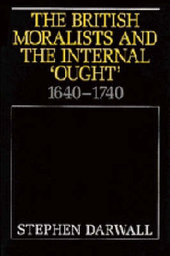
|
The British Moralists and the Internal 'Ought': 1640-1740
Hardback
Main Details
| Title |
The British Moralists and the Internal 'Ought': 1640-1740
|
| Authors and Contributors |
By (author) Stephen Darwall
|
| Physical Properties |
| Format:Hardback | | Pages:372 | | Dimensions(mm): Height 236,Width 160 |
|
| Category/Genre | History of Western philosophy
Ethics and moral philosophy |
|---|
| ISBN/Barcode |
9780521451673
|
| Classifications | Dewey:192 |
|---|
| Audience | | Professional & Vocational | |
|---|
|
Publishing Details |
| Publisher |
Cambridge University Press
|
| Imprint |
Cambridge University Press
|
| Publication Date |
26 May 1995 |
| Publication Country |
United Kingdom
|
Description
This book is a major work in the history of ethics, and provides the first study of early modern British philosophy in several decades. Professor Darwall discerns two distinct traditions feeding into the moral philosophy of the seventeenth and eighteenth centuries. On the one hand, there is the empirical, naturalist tradition, comprising Hobbes, Locke, Cumberland, Hutcheson, and Hume, which argues that obligation is the practical force that empirical discoveries acquire in the process of deliberation. On the other hand, there is the group including Cudworth, Shaftesbury, Butler, and in some moments Locke, which views obligation as inconceivable without autonomy and which seeks to develop a theory of the will as self-determining.
Reviews'Positive Psychology begins with Frances Hutcheson early in the Scottish Enlightenment. Michael Gill's lucid exposition of the heavyweight thinkers of this movement is the place to begin to understand this crucial period of intellectual history.' Martin Seligman, University of Pennsylvania 'In Michael Gill's hands, the 'human nature question' becomes a powerful analytic tool that illuminates all kinds of interesting issues in early modern British moral philosophy. This book opens up insufficiently appreciated philosophical texts in ways that are simply wonderful.' Stephen Darwall, University of Michigan 'In this tour-de-force Michael Gill convincingly redefines the course of British moral philosophy over the seventeenth and early eighteenth- centuries. With sure philosophical judgment he weaves his narrative around the oscillation between pessimistic and optimistic views human nature in the major writers of the period, culminating in the cautiously progressive and subtle reconciliation in David Hume. All future work on the history of the Enlightenment, and the philosophy of the time, will need to start with this book.' Simon Blackburn, University of Cambridge
|